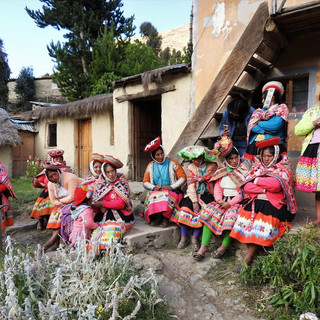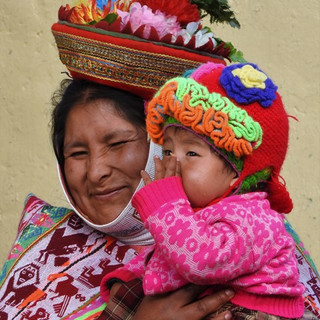Among women
- Anna Książek, Andrea Pucci
- 22 kwi 2020
- 4 minut(y) czytania
Zaktualizowano: 26 kwi 2021

Among women
WARMIPURA
Sacred Valley| Peru
I went to the law school in Lima, Peru, thinking as a lawyer I will be able to design and apply the rules in a fair way, protecting the interest of the vulnerable population. I worked for more than 5 years at the Peruvian Constitutional Court as a judicial assistance and court counselor. I was very disappointed to see how the political agenda, economic interests and the catholic church interfered directly in the way rules were interpreted and in the way to balancing human rights when a conflict between parties arose. Looking for another perspective to apply the rules in a fair way, I went to the business school to obtain a master degree in Finances & Corporative Law. After that I worked for profit and non-profit organizations as a legal and financial advisor and again the pursuit of profit was far more important than my efforts to align profitability with social impact. I decided to give myself a break and travel to see with my own eyes how things are going in different countries around the world. After travelling for two years I came back to Peru and I moved to the Sacred Valley of the Incas, Cusco. My awakening journey already started, so I was seeking opportunities to use my skills in a meaningful way, creating lasting impact in the life of people.
One day I was hiking in the mountains around the Sacred Valley and I met a group of ladies from a local tribe. None of them could speak Spanish, Quechua is their language. They asked me with a gesture to leave my phone number. After a few days their leader, who spoke Spanish, called me. She wanted to meet and do something together. I came back to them and she explained to me what they work on - they create beautiful fabrics, clothes full of colors and meanings. They were looking for support, guidance and advice, to reach people, potential customers. Sometimes they would go down to Cusco to sell, but the true is that business is not something they have in their culture. In Quechua language words like budget, income or business don't even exist. They didn't know how to sell, how to calculate the price. But they know how to do very unique products.
The adventure started when I connected with other like-minded women and together decided to figure out what we could do. First thing they needed was work, so we decided to put our skills together and create a non-profit organization that can host sustainable profitable ventures to allow all the women involved to generate a source of income. We called it Warmipura. That was the first step. There was no point to come to them with an educational program from day one, because they needed to fill their stomach first.
We have started with products which wouldn't change their own design too much. We may change colors a bit to adjust to market needs, but not the patterns themselves. We don't want them to forget their own traditional way of doing things, we don't want them to become cheap hands preparing whatever designs. Their own fabrics are very special, they literally say the story of their life, every symbol has a very specific meaning.
We got more and more people involved - designers, networkers. We work with women, there is still a lot of preconception in Peru that working with men is better. Few days ago we got invited to a fair in Lima. That's a 1000 km away, most of the ladies never even thought to get this far. It's a fair of sustainable and socially responsible products, I volunteered for them helping with legal issues and they offered me a free stand for Warmipura. We are going now to the village to decide together who will come, how to organize the work, what to bring, plan a bit to try to give people in Lima a full experience of how this piece of fabric is produced, from cutting the fur of the animal till it becomes a piece of art. One piece takes sometimes 3 months of work! Everything is done the natural way, in full harmony. They work as a community. Everybody knows what to do. If one comes later for the meeting maybe starts to cook for others, or take care of the kids. Everything is based on exchange, reciprocity. If I have to build a house, all the community will come to help me, because next time when you build your house, all communities will come as well. Now things started to change, men were forced to look for work outside, many of them try to get hired as porters along the Inca trail toward Machu Picchu. They stay outside the village most of the time, women had to take over all responsibilities: they take care of plants, animals, children, the home. They have less time for their needlecraft.
Another challenge is communication, on many different levels. The women we work with speak Quechua, we speak Spanish. We know that we have to learn Quechua too, if we want to understand better, but also something about communication between women that is beyond words. Definitely one part of the education program is to provide Spanish lessons to them. For now we explain business with images, infographics. We try to co-create, without any hierarchy. We don't want to follow the patriarchal patterns.
The big vision is not only to create a sustainable business, but also a network of women, worldwide, which can support each other, to create new opportunities in pursuit of our own empowerment. Warmipura means “entre mujeres”, among women, in Quechua.
What we do it's just a small thing, a drop in the ocean. But the ocean is made from those drops. Sometimes we don't even try, because we don't see results. We have to let results go. We can plant seeds, everybody can plant seeds. Just start to plant with whatever actions you are doing for a better world. Be together and work together in harmony for a higher purpose. Some seeds will grow, for sure.
More about Warmipura: facebook.com/warmipuraperu





































Komentarze